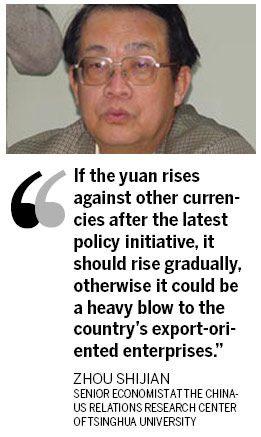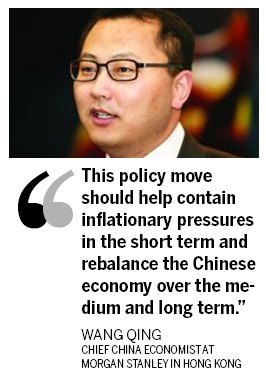Economy
Bank stance to ease inflation risk
(China Daily)
Updated: 2010-06-22 09:46
 |
Large Medium Small |

The recent adjustment in China's currency policy is a move in the right direction, marking a key step in the reform of China's exchange rate regime towards a more market-based one.
If the yuan rises against other currencies after the latest policy initiative, it should rise gradually, otherwise it could be a heavy blow to the country's export-oriented enterprises.
Mild yuan appreciation will spur export companies to continue to improve their technology and management, but a hasty and big increase in the yuan's exchange rate would be the death knell for these companies. The 11 percent appreciation in the yuan between October 2007 and July 2008 led to the bankruptcies of some 67,000 export companies and mass job losses.
It is expected that the yuan will only go up within a limited range. European economies face the risk of a double-dip and have decided to cut spending to fight the debt crisis, which will definitely affect consumption in those countries and thus pose a threat to China's exports to Europe. If the yuan rises against the dollar this year, the margin would only be very slight. China will allow its currency to appreciate by up to 3 percent only if the country could make sure its exports rise by an average of 20 percent in 2011 and the global economy regains its sound growth momentum.

The central bank's decision helps contain "imported" inflationary pressures and therefore reduces the probability of aggressive monetary tightening through stringent credit controls and/or consecutive interest rate hikes.
This policy move should help contain inflationary pressures in the short term and rebalance the Chinese economy over the medium and long term.
A modest initial revaluation followed by gradual appreciation would fuel expectations of further yuan appreciation over time.
Although the central parity of the yuan-dollar exchange rate is, in principle, determined based on the weighted average of the quotes from market makers, it is still heavily managed by the People's Bank of China, which has considerable discretion over determining the weights when the weighted average is calculated.
Thus, the pace of renminbi appreciation ultimately hinges on how comfortable the Chinese authorities are with allowing faster appreciation of the central parity rate instead of intra-day volatility around the central parity rate.



